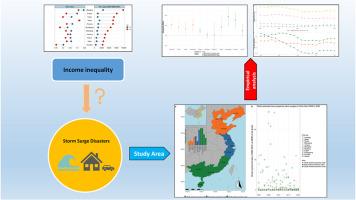经济发展的不平等增加了中国风暴潮灾害的直接经济损失
IF 4.8
2区 环境科学与生态学
Q1 OCEANOGRAPHY
引用次数: 0
摘要
沿海地区是全球经济活动最密集的地区,一直受到海洋灾害的威胁。随着气候变化加剧全球沿海社区的脆弱性,沿海灾害管理已成为海洋治理最紧迫的任务之一。虽然经济发展可以增强社会复原力,但经济增长带来的副作用--经济不平等,也会在社会对自然灾害的脆弱性方面发挥重要作用。沿海地区的管理者和决策者迫切需要相关分析来了解经济不平等与海洋灾害之间的关系。在此,我们分析了 2000-2020 年间中国 11 个沿海地区经济不平等与风暴潮灾害直接经济损失之间的联系。结果表明,省级收入不平等会显著增加风暴潮灾害造成的直接经济损失。省级可支配收入基尼指数每增加 1%,年损失增加 4.8%-7.8%。此外,省内收入差距每增加 1%,相对年损失(与省内 GDP 相比)增加 0.051%-0.056%。异质性分析表明,北部和东部海洋经济圈的损失受收入不平等的影响最大。我们还发现,随着经济发展水平的提高,收入不平等对损失的加剧效应变得更加显著。我们的研究表明,实现收入公平可能是减轻沿海灾害的一个关键因素,这为全球沿海灾害管理提供了新的视角。本文章由计算机程序翻译,如有差异,请以英文原文为准。

The inequality of economic development increases the direct economic loss of storm surge disaster in China
The coastal zone is the most intensive area of global economic activity and has been threatened by marine hazards. As climate change increases the vulnerability of coastal communities worldwide, coastal hazard management has become one of the most urgent tasks for ocean governance. While economic development may enhance social resilience, economic inequality, a side effect of economic growth, can play a significant role in social vulnerability to natural hazards. Coastal managers and policymakers urgently need relevant analyses to understand the relationship between economic inequality and marine hazards. Here, we analyzed the links between economic inequality and direct economic losses from storm surge disasters in 11 coastal regions of China between 2000 and 2020. Our results show that provincial income inequality significantly increases direct economic losses from storm surge disasters. For every 1% increase in the provincial disposable income Gini index, annual losses increase by 4.8%–7.8%. Moreover, with a 1% increase in the provincial income gap, relative annual losses (compared with provincial GDP) increase by 0.051%–0.056%. Heterogeneity analysis reveals that losses in northern and eastern marine economic circles are most affected by income inequality. We also find that with increasing economic development level, the aggravating effect of income inequality on losses becomes more significant. Our work indicated that achieving income equity may be a crucial factor for coastal hazard mitigation, which provides new insights into global coastal hazard management.
求助全文
通过发布文献求助,成功后即可免费获取论文全文。
去求助
来源期刊

Ocean & Coastal Management
环境科学-海洋学
CiteScore
8.50
自引率
15.20%
发文量
321
审稿时长
60 days
期刊介绍:
Ocean & Coastal Management is the leading international journal dedicated to the study of all aspects of ocean and coastal management from the global to local levels.
We publish rigorously peer-reviewed manuscripts from all disciplines, and inter-/trans-disciplinary and co-designed research, but all submissions must make clear the relevance to management and/or governance issues relevant to the sustainable development and conservation of oceans and coasts.
Comparative studies (from sub-national to trans-national cases, and other management / policy arenas) are encouraged, as are studies that critically assess current management practices and governance approaches. Submissions involving robust analysis, development of theory, and improvement of management practice are especially welcome.
 求助内容:
求助内容: 应助结果提醒方式:
应助结果提醒方式:


